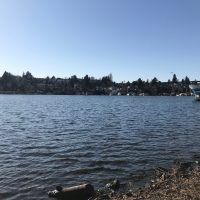Preparing for the Future of Our Planet: A Look at UW’s Climate Minor
Written by Jordan Winter
Climate change is one of the defining issues of our time. It seems like there are new developments every week—another storm to keep track of, rising levels of greenhouse gases, more species going extinct. With all that is going on in the world, what can I do about it? How can I use my voice and amplify the voices of others?
Questions like these are what led me to the climate science minor at UW. I craved a deeper understanding of the myriad issues our world faces. I see the value of delving deep into one field and becoming an expert, but at the same time, I want to be able to talk about everything from the atmosphere to the depths of the oceans. The variety of courses in the climate science minor, in addition to its flexibility, made it a no-brainer to add to my oceanography and dance majors.
Some of my favorite courses at UW have been in the minor. Environmental Change in the Glacial Ages (ESS 433) gave me new tools to think about climate change on a geologic timescale. Its seminar-style class discussions prepared me for grad school. Air Pollution Chemistry (ATM S 458) got me thinking about what pollutants we are dumping in the atmosphere and how we may be able to regulate them.
Everything is connected. The ocean doesn’t change by itself. Being able to understand what is happening to other spheres of our planet is imperative to understanding oceanic change as well. If I am going to one day focus my research on climate impacts in our oceans, I’ll need to be able to use knowledge of other systems as well. The minor has me well prepared for current interdisciplinary work in environmental science.

I plan to go to grad school for biological oceanography after I graduate in spring ‘22. I hope to focus on climate change impacts on corals or plankton. Although my focus is on the oceans, I’ve developed an interest in paleoecology from my climate minor classes as well. It’s imperative to study the past to prepare for the future. I am also considering working with environmental advocacy groups before grad school to get more outreach experience.
The minor also isn’t just for oceanography students, or even those in environmental science. It is inspiring to see the variety of backgrounds in my climate science classes. Other perspectives enrich discussions, I love hearing about other people’s interests. Someone might be just as excited about environmental policy as I am about coral reef restoration, and that’s awesome!
The climate science minor is also giving me the tools I need to be a better activist and science communicator. When new climate reports come out (for example, from the IPCC), I better understand them, and in turn, can explain them better to others. The class Climate and Climate Change (ATM S 211), one of the foundational courses you can take for the minor, gave me an overview of climate-related science and how the climate works on a broad scale. After that class, I felt much more confident clarifying current news stories and explaining climate mechanisms. I feel like each class in the minor adds to my toolbox. By graduation, I’ll be ready to face the challenges of an environmental activist and scientist.

The current pandemic has shown just how important it is to be prepared and listen to the experts. Similar to climate change, Covid-19 has been accompanied by misinformation. Education can help with mitigation and keeping people safe. It’s the same with climate change; we should be focusing on preventative measures instead of reactionary ones. This pandemic has shown me how vital it is to have a well-informed public, respected scientists, and safety protocols already in place. I hope that some of the lessons we learn from Covid-19 can help us prepare for the brunt of climate change.
With the growing threats facing us from climate change, understanding the science behind it is more important than ever. Our generation needs to be the ones to step up to the plate. No matter your background, the climate science minor can expand your worldview and help you tackle large-scale climate issues. It takes all of our diverse fields to work together to understand our planet better, and hopefully, make it a better place.
Jordan Winter is a Junior majoring in Oceanography and Dance and minoring in Climate Science. Contact her at jwinter2@uw.edu if you have any questions.